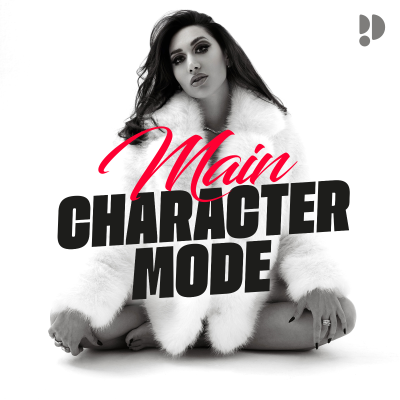
Legally Femtech
Podcast von Nixon Gwilt Law
The Legally Femtech podcast, sponsored by Nixon Gwilt Law, empowers femtech companies, creators, investors, and users to revolutionize women's health by providing practical, legal, and ethical insights into the healthcare startup community. Your host, Bethany Corbin, is a healthcare innovation and femtech attorney with almost a decade of experience. She is on a mission to help thought-leading companies disrupt and transform the global women's health sector. In each episode, Bethany discusses critical issues that impact women's health and offers invaluable tips for entrepreneurs looking to launch their own femtech products. With an exciting lineup of international guest speakers, Legally Femtech delves into the lifecycle of digital health startups - from idea conception to product design to fundraising, scaling, and exiting (and all of the legal considerations in between!). Tune in every other Wednesday for new episodes!
Kostenlos testen für 30 Tage
4,99 € / Monat nach der Testphase.Jederzeit kündbar.
Alle Folgen
26 FolgenIn this episode, Bethany Corbin and Virginia Franco discuss: * Why it is important to be humble and ask for help * Why you should follow quality standards from the beginning * How to inspire people to push back against stigma * How to manage the push and pull between regulation and innovation Key Takeaways: * You must allow yourself to ask for help. It’s important to be humble and to trust people. Treat each member as a part of the body of the product, it’ll be hard to live if one part doesn’t trust the other. You can’t know everything about the industry, you need to surround yourself with experts that you can trust. * If your company is not following proper quality standards, from the beginning, implementing them later becomes impossible. Launching your product as a wellness tool will prevent it from becoming a real diagnostic or medical device. * It has to be a part of every FemTech company to be creating initiatives that will inspire people to push back against taboos and stigma. Companies will need to collaborate with their target user base in order for their technology to grow and evolve. * There is a bit of a push and pull between innovation and regulation. Regulation is very important as it ensures that customers will not be harmed, but at the same time, when regulation becomes unnecessarily excessive, it could impede the progress of innovation. “Believe in your product and believe in the partners you bring. They will be the brain, heart, and legs of your product. It is difficult to live if you cannot trust some parts of your body, you will struggle more.” - Virginia Franco Learn More: LinkedIn: https://www.linkedin.com/in/virg%C3%ADnia-franco-14848216a/ [https://www.linkedin.com/in/virg%C3%ADnia-franco-14848216a/] Yoni Solutions Website: https://www.yonisolutions.com/ [https://www.yonisolutions.com/] Yoni Solutions LinkedIn: https://www.linkedin.com/company/yoni-solutions/ [https://www.linkedin.com/company/yoni-solutions/] Connect with Bethany Corbin: Website: https://nixongwiltlaw.com/ [https://nixongwiltlaw.com/] Podcast: https://nixongwiltlaw.com/podcast-legally-femtech [https://nixongwiltlaw.com/podcast-legally-femtech]
In this episode, Bethany Corbin and Sylvia Kang discuss: * Why launching a startup is more difficult than you expect * Why a product has to have a market fit * How to create a brand message that resonates with consumers * How organizational structure helps companies scale and grow Key Takeaways: * Launching a startup will always be harder than you think, so be prepared to plan and go through a process of trial and error. Be prepared to respond quickly, be nimble, and continue to test again and again. * If the customer doesn’t need the product, then it’ll be a losing battle no matter what marketing you’re doing. Eventually, you’re going to be unprofitable. * Design your marketing in a way that shows that your product could help solve their problem. Make their journey easier and experience better, and help your users achieve their goals. * Invest in your team and make sure that your managers know how to build a team, and how to grow and expand. There must be an organizational structure in order for the company to not be a mess, each one must be assigned to a job that they hold expertise in instead of just playing it by ear. “If you see things that don't work or only partially work, then try to expand on the part that's working…you have to respond quickly, be nimble, and continue to test and test and test again.” - Mira CEO Sylvia Kang Learn More: LinkedIn: https://www.linkedin.com/in/sylviakang/ [https://www.linkedin.com/in/sylviakang/] Mira LinkedIn: https://www.linkedin.com/company/miracare/ [https://www.linkedin.com/company/miracare/] Sylvia and Mira in Forbes: https://www.forbes.com/sites/cherylrobinson/2021/01/10/why-sylvia-kang-created-an-at-home-womens-health-monitoring-platform-that-predicts-ovulation/?sh=744b69e35a65 [https://www.forbes.com/sites/cherylrobinson/2021/01/10/why-sylvia-kang-created-an-at-home-womens-health-monitoring-platform-that-predicts-ovulation/?sh=744b69e35a65] Mira;s Website: https://usd.miracare.com/products/fertility-max-starter-kit?variant=41992270741690 [https://usd.miracare.com/products/fertility-max-starter-kit?variant=41992270741690] Connect with Bethany Corbin: Website: https://nixongwiltlaw.com/ [https://nixongwiltlaw.com/] Podcast: https://nixongwiltlaw.com/podcast-legally-femtech [https://nixongwiltlaw.com/podcast-legally-femtech]
In this episode, Bethany Corbin and Dallas Barnes discuss: * Why birth control shouldn’t be a one-size-fits-all solution * What misconceptions people have about birth control * Why it is important to get feedback from your users * How to manage the uphill battle of pitching in FemTech Key Takeaways: * Birth control is an individualized journey and not a one-size-fits-all solution. The solution for each person has to be personalized. Not every pill is the same and not every person is the same, there is always a difference in interaction. * Birth control products aren’t only for pregnancy prevention but also to address hormonal related symptoms, things that have a relationship with one’s cycle. At the end of the day, the goal really is to increase somebody’s quality of life. * In the FemTech industry, it’s important to sit down and talk to the people who are actually going to use your product as it will help shape and adjust the solution that you’re going to be providing. * Discomfort is a huge part of the entrepreneurial journey and every day you’ll meet a new challenge that will push you beyond your comfort zone. If you want to grow, you’ll have to get comfortable with being uncomfortable. “A lot of the problem stems from this one size fits all approach. We're just not asking the right questions upfront. We're not having these conversations that really celebrate someone's uniqueness and using that uniqueness as leverage and to our advantage in this decision-making process.” - Dallas Barnes Connect with Dallas Barnes: LinkedIn: https://www.linkedin.com/in/dallasjbarnes/ [https://www.linkedin.com/in/dallasjbarnes/] Reya Health Website: https://www.reyahealth.ca/ [https://www.reyahealth.ca/] Reya Health LinkedIn: https://www.linkedin.com/company/reya-health/ [https://www.linkedin.com/company/reya-health/] Connect with Bethany Corbin: Website: https://nixongwiltlaw.com/ [https://nixongwiltlaw.com/] Podcast: https://nixongwiltlaw.com/podcast-legally-femtech [https://nixongwiltlaw.com/podcast-legally-femtech]
In this episode, Bethany Corbin and Kate Batz discuss: * Why women’s health companies don’t get the attention they deserve * Creating progress in FemTech * Addressing women’s health span * Bringing attention to your health Key Takeaways: * Women’s health companies don’t get the attention they deserve because only 4% of tech investment goes into life sciences and part of the reason why is that femtech is relatively young and is still an emerging industry. * Creating more progress would require companies to focus on getting funding and to do that, they have to spread awareness on FemTech and women’s health care. * Women live longer, but not necessarily healthier since they have specific health needs that need to be addressed with solutions built to solve those problems. * Bring more attention to FemTech by bringing more attention to your own health. Whether you are a startup or a user, be curious and strive to discover more in the space of FemTech. “One of our goals is to bring more focus to FemTech because it is an under-serviced sector and women comprise half of the population. We live longer, not necessarily healthier.” - Kate Batz Resources: FemTech Analytics: https://www.femtech.health/ [https://www.femtech.health/] FemTech Analytics' Q4 2022 Report: https://www.femtech.health/report-q4-2022 [https://www.femtech.health/report-q4-2022] Connect with Kate Batz: Email: kate.batz@dkv.global LinkedIn: https://www.linkedin.com/in/kate-batz-1b37a9b7/ [https://www.linkedin.com/in/kate-batz-1b37a9b7/] Connect with Bethany Corbin: Email: bethany.corbin@nixongwiltlaw.com [bethany.corbin@nixongwiltlaw.com] Website: https://nixongwiltlaw.com/ [https://nixongwiltlaw.com/] Podcast: https://nixongwiltlaw.com/podcast-legally-femtech [https://nixongwiltlaw.com/podcast-legally-femtech]
In this episode, Bethany Corbin and Brittany Barreto discuss: * How to Empower your position in a founder-investor relationship * How a convertible note and a safe are different * What five terms you need to get familiar with in regard to convertible notes * How to push back and set your own terms Key Takeaways: * As a founder, you have power in the founder-investor relationship. Usually, you’ll know more than investors do, so don’t be afraid to provide value. See them as partners and not merely as a lender of money. * There are a couple of differences between a safe and a convertible note. First, there’s no interest in a safe because it’s not a loan while there is on convertible notes since they are a loan. They also differ when they convert into equity. For safes, it’s when you raise your price equity round and for convertible notes, it’s when you hit your qualified financing amount. Lastly, you can do a rolling basis of fundraising on a safe. * Here are the five terms you need to get familiar with in regard to convertible notes: maturity date, qualified financing, discount, interest, and valuation cap. * Be confident. Don’t be afraid to push back if a question doesn’t make sense and don’t wait for an investor to set the terms. Set your own terms and negotiate them. “You set your terms and then you can go out and negotiate them. You don't have to sit back and wait for an investor to tell you what you're worth.” - Brittany Barreto Connect with Dr. Brittany Barreto: Website: https://drbrittanybarreto.com/ [https://drbrittanybarreto.com/] LinkedIn: https://www.linkedin.com/in/brittanybarreto/ [https://www.linkedin.com/in/brittanybarreto/] Connect with Bethany Corbin: Website: https://nixongwiltlaw.com/ [https://nixongwiltlaw.com/] Podcast: https://nixongwiltlaw.com/podcast-legally-femtech [https://nixongwiltlaw.com/podcast-legally-femtech]
Kostenlos testen für 30 Tage
4,99 € / Monat nach der Testphase.Jederzeit kündbar.
Exklusive Podcasts
Werbefrei
Alle frei verfügbaren Podcasts
Hörbücher
20 Stunden / Monat

































